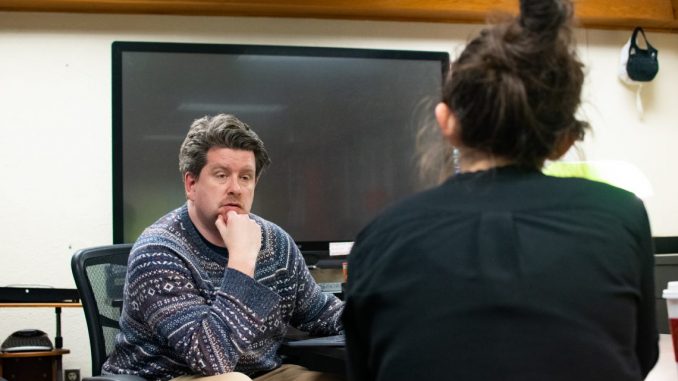One of the participants in our stroke group had aphasia pretty bad. But during bowling he could swear up a storm.
Temple researchers link brain injuries and curse words
A professor and his team studied taboo words to help brain injury patients regain language use.

While working as a speech therapist, Jamie Reilly found people with brain injuries may lose the ability to use language, but can still curse.
“When you have a bad brain injury that affects the left side, sometimes people can lose all aspects of language but keep cursing,” Reilly said. “They basically won’t be able to name anything, picture of a dog, but they can say the F-word just fine.”
Reilly, a communication sciences and disorders professor and director of the Concepts and Cognition Laboratory in the College of Public Health, is researching the relationship between curse words and behavioral control in patients with strokes or aphasia, a language disorder due to brain injury. The laboratory’s first paper on the subject was published in this month’s issue of The Psychonomic Bulletin and Review, a psychology journal.
Through a study and brain stimulation with curse words on participants, Reilly and his team found cursing is specially encoded in the brain. The team hopes to expand their research in the future to include how patients can gain more language control.
The research began in 2017 by studying a patient’s response to hearing curse words through his eye dilation, Reilly said. Normally, people’s eyes dilate very quickly when they hear curse words because of the words’ effect on the brain — this was not the case with their patient.
“It’s an interesting effect where we experience this sort of arousal and this need to inhibit, he didn’t have that at all,” Reilly said.
It led to a second study a year later on how taboo words are encoded in the brain so deeply people who have lost language can still use it, said Peter Twigg, a second-year neuroscience student, who also researches in the lab.
The research team wants to provide more evidence on the formation of curse words and their taboo nature to inform caregivers on how to treat brain injury patients, Twigg said.
“When you’re treating somebody who has aphasia, or [traumatic brain injury] or stroke, these are issues that you would encounter on a daily basis,” he added. “So our research helps to inform us and the scientific community more largely about how to deal with that, how to understand that what’s happening in the brain and then hopefully in future studies, how we can help to treat it and alter it so that we can make life you know, more accommodating.”
Reilly and his team then carried out a third study on brain stimulation and measured the participants’ eye movement and responses while they read curse words. The team repeated the process after stimulating their brains for 20 minutes to check for changes.
The process, called transcranial direct current stimulation, used a hat-like device, with negative and positive current and electrodes, attached to the head. The currents go through the brain and change the excitation level of the different parts of the brain it is on, Reilly said.
“That study was more like proof of concept,” said Bonnie Zuckerman, the lab’s research associate. “Cursing is reported in the right hemisphere, which is also what damage has shown. Damage in their left, cursing happens more, damage in their right, cursing happens less.”
The research team used this process to help people with Alzheimer’s disease as it stimulates certain parts of their brain that are not working well, Reilly said. They are looking into the process as a therapy option to regulate emotions and language, Zuckerman added.
Four journals previously rejected their published research, which may be because of the controversial nature of curse words, Reilly said.
They then removed some curse words and represented them as data points and codes instead, in order to get their research published, Twigg said.
“Nobody really wants to deal with these words, but they are part of our lives all the time,” he added. “You have to deal with whether you include gendered speech and hate speech or you know, racial terms and things like that and all of those get very challenging to code and challenging to include.”
Reilly hopes their research starts a conversation about curse words in science, and use it to help people with brain injury.
“People who experience uncontrolled cursing experience fairly
significant degree of distress, but we really don’t know anything about
how to help them,” Reilly said. “Cursing is the subset of language
really, a lot needs to be learned about and then developing
interventions that can help people, I think is important.”
No comments:
Post a Comment